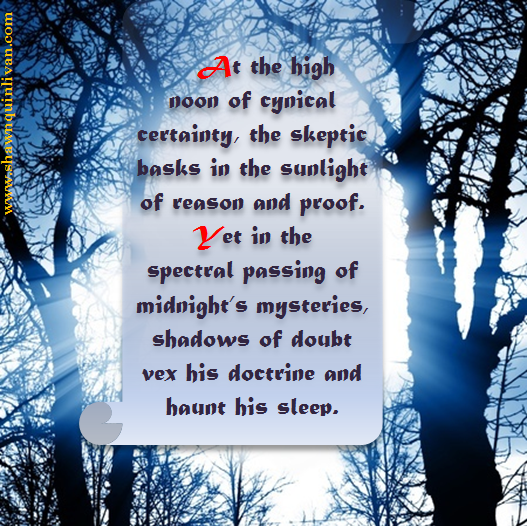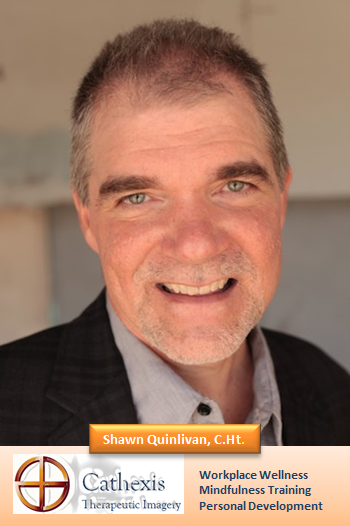
Those who identify themselves as ‘cynics’ and ‘skeptics’ commonly affect an aloof intellectualism and take pride in their cleverness and humor. Yet such posturing often serves as denial of an underlying fearfulness, especially of those enigmatic aspects of reality that defy logical explanation.
Skepticism is the application of reason and critical thinking to determine validity; it is the process of finding a supported conclusion. Cynicism is the awareness that people can be deceptive, untrustworthy and motivated purely by self-interest. Being both open-minded and critical when evaluating information, and adequately scrutinizing the qualifications and character of the individuals who present it to us, are healthy and useful applications of skepticism and cynicism.
Yet all too often there is an attitude of hostility attached to the skeptical viewpoint, a presumption of the worst in people and an unwillingness to consider ideas and concepts that defy convention or transcend the tried and true. There is also an element of insecurity familiar to the cynic, an anxious and easily threatened disposition that is quick to judge and hides behind highbrow comments and polarizing witticisms. And sadly, a certain amount of pride and self-satisfaction are common to this derisive and emotionally detached demeanor.
Fear Is The Elephant In The Room
Our training programs at Cathexis Therapeutic Imagery include teaching both private and corporate clients mindfulness and emotional intelligence through the incorporation of trance states such as meditation, hypnosis and therapeutic imagery. Thousands of studies conducted by hundreds of independent researchers have demonstrated the benefits of meditation and hypnosis in reducing stress, managing emotional reactivity, improving focus and concentration, strengthening immune system function, and treating an array of medical and mental health related conditions. (The findings of these and other peer reviewed research studies are available in my article: A Review Of The Significant Research On Hypnosis, Meditation & Trance States.)
The evidence is overwhelming and, in fact, mindfulness meditation is being widely used in business to facilitate healthy and productive environments and positive workplace culture.  Nonetheless, there are still many skeptics who assign a degree of “woo woo” to the practice of trance state healing techniques and the idea of mind over matter, or expansion of consciousness beyond mere thought. This speaks to fear; specifically, fear of loss of control in individuals who prefer the left-brained functionality and structure of analyzing and processing information. Yet this kind of cynicism also represents a quagmire of unbelief that exists in the world of human potential, a dismissive sentiment which undermines the value of holistic health practices and the spiritual aspects of self-actualization.
Nonetheless, there are still many skeptics who assign a degree of “woo woo” to the practice of trance state healing techniques and the idea of mind over matter, or expansion of consciousness beyond mere thought. This speaks to fear; specifically, fear of loss of control in individuals who prefer the left-brained functionality and structure of analyzing and processing information. Yet this kind of cynicism also represents a quagmire of unbelief that exists in the world of human potential, a dismissive sentiment which undermines the value of holistic health practices and the spiritual aspects of self-actualization.
“Proof” is the vernacular of the cynic. Science speaks in terms of “evidence.” And the materialist view of reality—the assumption that the physical processes of the universe exist beyond subjective perception—has not been substantiated by mathematics or empirical observation. In fact, reality is known only through sensory interaction, the way our mind relates to light, sound, smell, touch and taste.
The core of emotional intelligence is understanding love and fear as the fundamental elements of human motivation. Love connects and fear divides. Pessimism, sarcasm and skepticism are rooted in fear because they ultimately express limitation and separation. And cynicism—the unhealthy compensation for fear that manifests as haughty and disparaging points of view—represents a cowardice of compassion, curiosity and unity.
Expanded Consciousness
Ours is not a world of absolutes. Developing the ability to recognize and fully trust our powers of perception, to realize deeper wisdom and enlightenment, to experience profound insight and fulfill our journey of purpose, are ultimately endeavors of spiritual self-discovery.
Expanded consciousness involves opening up to the sacred bond of creation and inviting divinity in its many enigmatic forms—these are functions of inclusion rather than exclusion, of being liberated from constrained convictions, of embracing infinite possibility rather than limited proof—and of connecting instead of dividing, both within ourselves and to the living universe.
©2016 Shawn Quinlivan, C.Ht. & Cathexis Therapeutic Imagery. All Rights Reserved.
 Cathexis Therapeutic Imagery specializes in innovative approaches to workplace wellness, mindfulness training, and personal development. Via private coaching, presentations, workshops, training events, and our partnership in the unique online wellness community Your Wellness Room—used by Kaiser Permanente, EFactor and other notable companies—our nationally recognized programs and practices help people and organizations make positive changes. Please call for a free consultation at (818) 512-4371 orcontact us via email.
Cathexis Therapeutic Imagery specializes in innovative approaches to workplace wellness, mindfulness training, and personal development. Via private coaching, presentations, workshops, training events, and our partnership in the unique online wellness community Your Wellness Room—used by Kaiser Permanente, EFactor and other notable companies—our nationally recognized programs and practices help people and organizations make positive changes. Please call for a free consultation at (818) 512-4371 orcontact us via email.
 Recognizing and understanding the disenchantment of failed ideals and fallen idols, abandonment of hope, the volatility of subdued rage, and the anguish of isolation, are rites of passage within ourselves, inner journeys that continue to define us throughout our lives. Wisdom eschews the fearful fissures and grottos of the mind by courageously embracing hardship, however calamitous or ill-fated, with gratitude instead of disdain. Thus, an enduring character and self-regard―a complexity of sadness―is forged into a candle-lit pathway of existence, one that casts a warm glow into the shadows and welcomes those who linger there.
Recognizing and understanding the disenchantment of failed ideals and fallen idols, abandonment of hope, the volatility of subdued rage, and the anguish of isolation, are rites of passage within ourselves, inner journeys that continue to define us throughout our lives. Wisdom eschews the fearful fissures and grottos of the mind by courageously embracing hardship, however calamitous or ill-fated, with gratitude instead of disdain. Thus, an enduring character and self-regard―a complexity of sadness―is forged into a candle-lit pathway of existence, one that casts a warm glow into the shadows and welcomes those who linger there.



